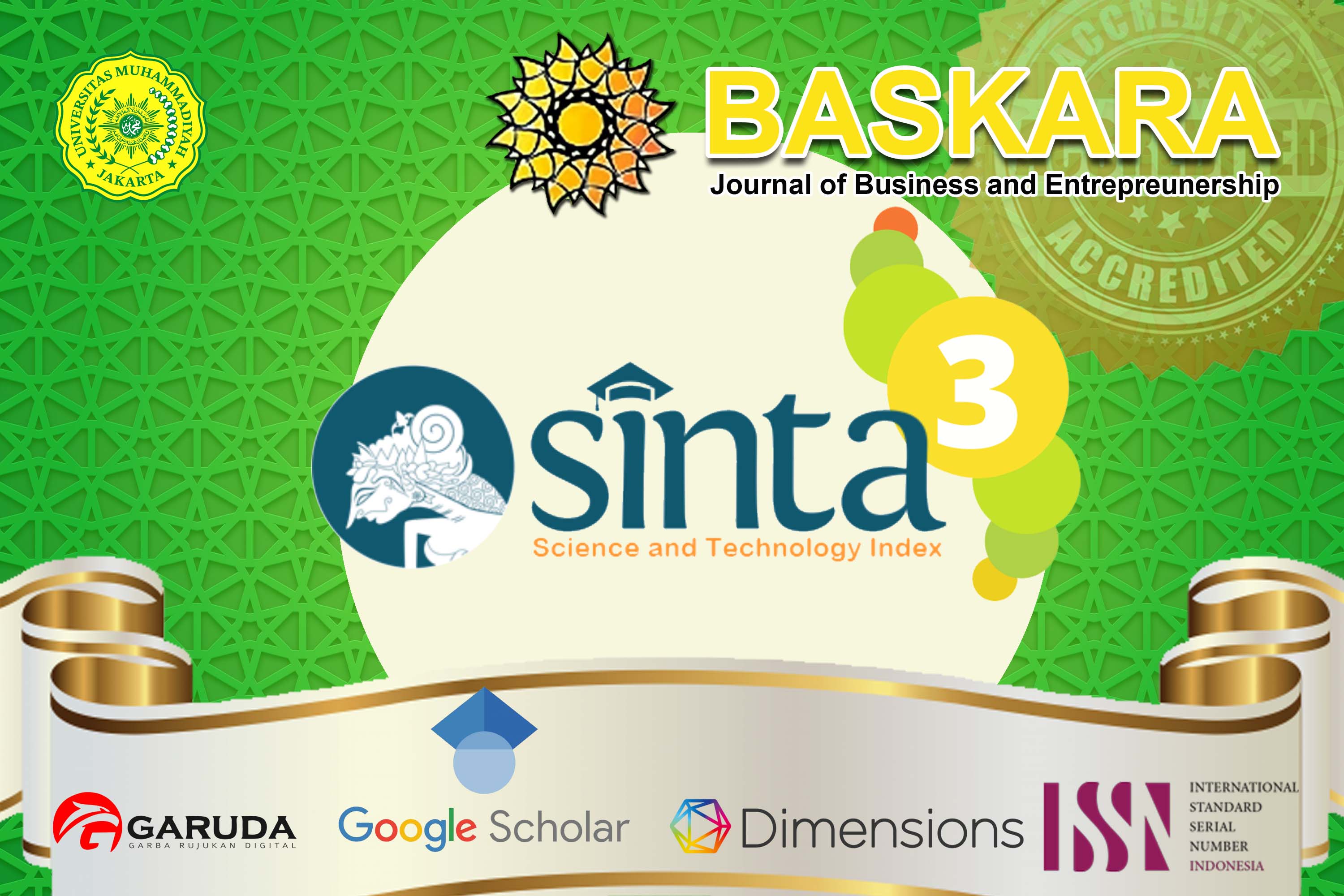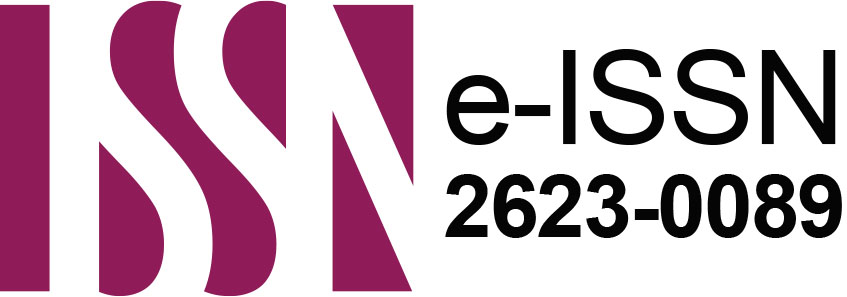Fast Food Industry Investigation: The Role of Brand Attitude and Brand Loyalty on Purchase Intentions in Generation Z based on Theory of Reasoned Action
Abstract
This study explores the concepts of brand attitude and brand loyalty among generation z to generate purchase intention in the fast food restaurant industry. Researchers use quantitative methods and use surveys to obtain primary data. The data obtained were then processed using SPSS and AMOS. The total respondents collected in this study were 204 generation Z people who consumed products at fast food restaurants. Variables used in this study include brand attitude, purchase intention, electronic word of mouth, and brand loyalty. The brand loyalty variable in this study will act as a renewal variable mediating between the electronic word of mouth and purchase intention variables. The results of this study show that electronic word of mouth positively affects brand attitude variable but has no effect on brand loyalty variable. Brand attitude variable has a significant impact on brand loyalty variable and purchase intention variable. Brand loyalty variable has a significant effect on purchase intention variable. These findings align with the theory of reasoned action, which states attitude that appears in a person will affect the intention shown in him. The gap in this study is brand attitude because there are differences in previous studies.
Keywords
Full Text:
PDFReferences
Akturan, Ulun. 2018. “How Does Greenwashing Affect Green Branding Equity and Purchase Intention? An Empirical Research.” Marketing Intelligence and Planning 36(7):809–24. doi: 10.1108/MIP-12-2017-0339.
Anandya, Dudi, Monica Engelica Wewengkang, and - Indarini. 2019. “How Spoke Character Influences Brand Equity.” 74(AICMaR 2018):144–47. doi: 10.2991/aicmar-18.2019.31.
Anastasiei, Bogdan, and Nicoleta Dospinescu. 2019. “Electronic Word-of-Mouth for Online Retailers: Predictors of Volume and Valence.” Sustainability (Switzerland) 11(3). doi: 10.3390/su11030814.
Babić Rosario, Ana, Kristine de Valck, and Francesca Sotgiu. 2020. “Conceptualizing the Electronic Word-of-Mouth Process: What We Know and Need to Know about EWOM Creation, Exposure, and Evaluation.” Journal of the Academy of Marketing Science 48(3):422–48. doi: 10.1007/s11747-019-00706-1.
Chetioui, Youssef, Irfan Butt, and Hind Lebdaoui. 2021. “Facebook Advertising, EWOM and Consumer Purchase Intention-Evidence from a Collectivistic Emerging Market.” Journal of Global Marketing 34(3):220–37. doi: 10.1080/08911762.2021.1891359.
Choedon, Tenzin, and Young-chan Lee. 2020. “The Effect of Social Media Marketing Activities on Purchase Intention with Brand Equity and Social Brand Engagement: Empirical Evidence from Korean Cosmetic Firms.” The Knowledge Management Society of Korea 21(3):141–60.
Chuenban, Pichit, Puris Sornsaruht, and Paitoon Pimdee. 2021. “How Brand Attitude, Brand Quality, and Brand Value Affect Thai Canned Tuna Consumer Brand Loyalty.” Heliyon 7(2):e06301. doi: 10.1016/j.heliyon.2021.e06301.
Chun, Se Hak, and Ariunzaya Nyam-Ochir. 2020. “The Effects of Fast Food Restaurant Attributes on Customer Satisfaction, Revisit Intention, and Recommendation Using DINESERV Scale.” Sustainability (Switzerland) 12(18):1–19. doi: 10.3390/SU12187435.
Creswell, John W., and J. David Creswell. 2018. Mixed Methods Procedures.
Fulkerson, Jayne A. 2018. “Fast Food in the Diet: Implications and Solutions for Families.” Physiology and Behavior 193(2017):252–56. doi: 10.1016/j.physbeh.2018.04.005.
Ghorbanzadeh, Davood, and Atena Rahehagh. 2020. “The Role of Emotional Structures in the Relationship between Satisfaction and Brand Loyalty.” Cogent Psychology 7(1). doi: 10.1080/23311908.2020.1782098.
Hang Phan, Nga Thi, Thang Quyet Nguyen, Dung Quang Truong, and Nguyen The Huynh. 2019. “The Effect of Brand Equity Components on Automobile Purchase Intention of Consumers in Ho Chi Minh City, Vietnam.” Journal of Asian Finance, Economics and Business 6(2):135–45. doi: 10.13106/jafeb.2019.vol6.no2.135.
Hossain, Md Alamgir, Nusrat Jahan, Yuantao Fang, Saiful Hoque, and Md Shakhawat Hossain. 2019. “Nexus of Electronic Word-of-Mouth to Social Networking Sites: A Sustainable Chatter of New Digital Social Media.” Sustainability (Switzerland) 11(3):1–14. doi: 10.3390/su11030759.
Huo, Chunhui, Javaria Hameed, Mo Zhang, Ahmad Fahme Bin Mohd Ali, and Nik Alif Amri Nik Hashim. 2022. “Modeling the Impact of Corporate Social Responsibility on Sustainable Purchase Intentions: Insights into Brand Trust and Brand Loyalty.” Economic Research-Ekonomska Istrazivanja 35(1):4710–39. doi: 10.1080/1331677X.2021.2016465.
Hwang, Jinsoo, Jawad Abbas, Kyuhyeon Joo, Seung Woo Choo, and Sunghyup Sean Hyun. 2022. “The Effects of Types of Service Providers on Experience Economy, Brand Attitude, and Brand Loyalty in the Restaurant Industry.” International Journal of Environmental Research and Public Health 19(6). doi: 10.3390/ijerph19063430.
Karamchandani, Shikha, Anushree Karani, and Mitesh Jayswal. 2021. “Linkages Between Advertising Value Perception, Context Awareness Value, Brand Attitude and Purchase Intention of Hygiene Products During COVID-19: A Two Wave Study.” Vision. doi: 10.1177/09722629211043954.
Kim, Haeok Liz, and Sunghyup Sean Hyun. 2019. “The Relationships among Perceived Value, Intention to Use Hashtags, EWOM, and Brand Loyalty of Air Travelers.” Sustainability (Switzerland) 11(22). doi: 10.3390/su11226523.
Kunja, Sambashiva Rao, Arvind Kumar, and Bramhani Rao. 2022. “Mediating Role of Hedonic and Utilitarian Brand Attitude between EWOM and Purchase Intentions: A Context of Brand Fan Pages in Facebook.” Young Consumers 23(1):1–15. doi: 10.1108/YC-11-2020-1261.
Lu, Benjiang, and Zhenjiao Chen. 2021. “Live Streaming Commerce and Consumers’ Purchase Intention: An Uncertainty Reduction Perspective.” Information and Management 58(7):103509. doi: 10.1016/j.im.2021.103509.
Mitchell, Andrew A., Jerry C. Olson, Andrew A. Mitchell, and Jerry C. Olson. 1973. “American Marketing Association.” Journal of Marketing Research 10(4):ii–ii. doi: 10.1177/002224377301000402.
Pal, Bhupinder, Singh Chahal, G. Vijayalaxmi, Krity Gulati Mehra, Kiran Jalem, and S. Radhakrishnan. 2022. “Effect Of E-Word of Mouth on Brand Equity and Intention to Purchase : A Study on Green Products in The Retail Sector.” Journal of Positive Schoo; Psychology 6(4):9917–24.
Pérez-Villarreal, Héctor Hugo, María Pilar Martínez-Ruiz, and Alicia Izquierdo-Yusta. 2019. “Testing Model of Purchase Intention for Fast Food in Mexico: How Do Consumers React to Food Values, Positive Anticipated Emotions, Attitude toward the Brand, and Attitude toward Eating Hamburgers?” Foods 8(9). doi: 10.3390/foods8090369.
Quoquab, Farzana, Nur Zulaikha Mohamed Sadom, and Jihad Mohammad. 2020. “Driving Customer Loyalty in the Malaysian Fast Food Industry: The Role of Halal Logo, Trust and Perceived Reputation.” Journal of Islamic Marketing 11(6):1367–87. doi: 10.1108/JIMA-01-2019-0010.
Ramesh, Kumar, Raiswa Saha, Susoban Goswami, Sekar, and Richa Dahiya. 2019. “Consumer’s Response to CSR Activities: Mediating Role of Brand Image and Brand Attitude.” Corporate Social Responsibility and Environmental Management 26(2):377–87. doi: 10.1002/csr.1689.
Sarteshnizi, Aliakbar Reeisi. 2021. “Investigating the Effect of Brand Certification on Brand Reputation with the Mediating Role of Brand Attitude and Consumers’ Awareness in Ansar Bank.” Turkish Journal of Computer and Mathematics Education 12(11):6674–86.
Saxena, Noopur, and Mayur Taneja. 2020. “Youth Preferences for Fast Food Industry: A Conjoint Approach.” International Journal of Public Sector Performance Management 6(4):456–66. doi: 10.1504/IJPSPM.2020.109302.
Setiawan, Putu Yudi. 2014. “The Effect of E-WOM on Destination Image, Satisfaction and Loyalty.” International Journal of Business and Management Invention ISSN (Online 3(1):2319–8028.
Singh, Ramendra Pratap, and Neelotpaul Banerjee. 2018. “Exploring the Influence of Celebrity Credibility on Brand Attitude, Advertisement Attitude and Purchase Intention.” Global Business Review 19(6):1622–39. doi: 10.1177/0972150918794974.
Sulthana, A. Navitha, and S. Vasantha. 2019. “Influence of Electronic Word of Mouth EWOM on Purchase Intention.” International Journal of Scientific and Technology Research 8(10):1–5.
Syahrivar, Jhanghiz, and Andy Muhammad Ichlas. 2018. “The Impact of Electronic Word of Mouth (E-WoM) on Brand Equity of Imported Shoes: Does a Good Online Brand Equity Result in High Customers’ Involvements in Purchasing Decisions?” The Asian Journal of Technology Management (AJTM) 11(1):57–69. doi: 10.12695/ajtm.2018.11.1.5.
Vidyanata, Deandra, Sunaryo Sunaryo, and Djumilah Hadiwidjojo. 2018. “The Role of Brand Attitude and Brand Credibility As a Mediator of the Celebrity Endorsement Strategy To Generate Purchase Intention.” Jurnal Aplikasi Manajemen 16(3):402–11. doi: 10.21776/ub.jam.2018.016.03.04.
Wang, Xiao Wu, Yu Mei Cao, and Cheol Park. 2019. “The Relationships among Community Experience, Community Commitment, Brand Attitude, and Purchase Intention in Social Media.” International Journal of Information Management 49(October 2018):475–88. doi: 10.1016/j.ijinfomgt.2019.07.018.
Wong, Anthony Tik-Tsuen. 2019. “A Study of Purchase Intention on Smartphones of Post 90s in Hong Kong.” Asian Social Science 15(6):78. doi: 10.5539/ass.v15n6p78.
Xiao, Aiyun, Shaohua Yang, and Qaisar Iqbal. 2019. “Factors Affecting Purchase Intentions in Generation y: An Empirical Evidence from Fast Food Industry in Malaysia.” Administrative Sciences 9(1):1–16. doi: 10.3390/admsci9010004.
Yodpram, Somcanae, and Nuchjarin Intalar. 2020. “Effects of Ewom, Brand Image, and Brand Attitude on Consumer’S Willingness To Pay More in the Low-Cost Airline Industry in Thailand Pjaee, 17(7) (2020) Effects of Ewom, Brand Image, and Brand Attitude on Consumer’S Willingness To Pay More in the Low-Cost .” 17(7).
Yu, Mingzhou, Fang Liu, Julie Lee, and Geoff Soutar. 2018. “The Influence of Negative Publicity on Brand Equity: Attribution, Image, Attitude and Purchase Intention.” Journal of Product and Brand Management 27(4):440–51. doi: 10.1108/JPBM-01-2017-1396.
Yuanita, Asih Dewi, and Endy Gunanto Marsasi. 2022. “THE EFFECT OF BRAND ATTACHMENT , BRAND EXPERIENCE , AND SELF-IMAGE CONGRUENCE ON THE PURCHASE INTENTION OF LUXURY.” 11(3):292–310.
Yusoff, S. M., & Azmel, A. A. M. A. (2022). Brand Awareness: The Influence of Social Media During the Covid-19 Pandemic. BASKARA: Journal of Business and Entrepreneurship, 5(1), 68-82.
Yudha Parwati, Kardina, Fatchur Rohman, and Astrid Puspaningrum. 2021. “The Effect of Self-Congruity and Celebrity Endorsement on Brand Loyalty With Brand Attitude As a Mediation Variables.” Jurnal Aplikasi Manajemen 19(1):156–65. doi: 10.21776/ub.jam.2021.019.01.14.
Yusoff, Sitinurbayu Mohd, and Azeera Azeasharmel Mohd Azreen Azmel. 2022. “Brand Awareness: The Influence of Social Media During the Covid-19 Pandemic.” BASKARA: Journal of Business and Entrepreneurship 5(1):68–82.
Zeren, Deniz, and Ali Kara. 2021. “Effects of Brand Heritage on Intentions to Buy of Airline Services: The Mediating Roles of Brand Trust and Brand Loyalty.” Sustainability (Switzerland) 13(1):1–15. doi: 10.3390/su13010303.
Zhou, Qin, Kum Fai Yuen, and Yusen Ye. 2022. “The Effect of Brand Loyalty and Loss Aversion on Competitive Trade-in Strategies.” Total Quality Management and Business Excellence 33(9–10):1084–1112. doi: 10.1080/14783363.2021.1933423.
DOI: https://doi.org/10.54268/baskara.v5i2.16005
Refbacks
- There are currently no refbacks.
Copyright (c) 2023 BASKARA : Journal of Business and Entrepreneurship
BASKARA: Journal of Business and Entrepreneurship Copyright of Baskara: Journal of Business and Entrepreneurship (e-ISSN: 2623-0089 ). This work is licensed under a Creative Commons Attribution-NonCommercial 4.0 International License |
















